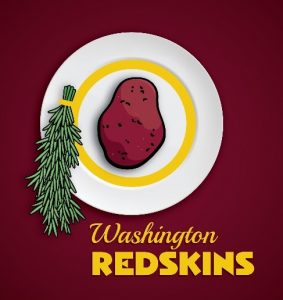
Pretty Intimidating…no?
We previously examined the never-ending saga of the National Football League’s Washington Redskins and the cancellation of some of their trademarks, namely those featuring the word “Redskins,” back in mid-2014.
However,as previously alluded, this matter is far from over and counsel for the Redskins recently filed their opening brief in the United States Court of Appeals for the Fourth Circuit. Briefs from all parties are to be due by December 22, 2015.
The Redskins’ brief examines 5 main issues:
1. Whether the disparagement clause of the Lanham (trademark) Act violates the 1st Amendment of the US Constitution.
2. Whether the disparagement clause is impermissibly vague violating the 1st and 5th Amendments of the US Constitution.
3. Whether the delay (over 40 years) between registering the trademarks and cancelling the trademarks violates due process.
4. Whether the “Redskins” mark was disparaging when initially registered in 1967.
5. Whether laches, or a delay in filing the lawsuit, bars cancellation of the trademarks.
To each point the Redskins argue….
1. The disparagement clause violates the First Amendment of the US Constitution because it facially discriminates based on content and viewpoint. Trademarks are expressive, and the purpose of registration is to protect trademark owners from interference by private parties who could otherwise infringe or dilute the communicative value of the marks. Further, this clause substantially burdens protected speech by withdrawing registration of trademarks that convey messages the government disfavors.
2. The disparagement clause is unconstitutionally vague. Whether a trademark “disparages” a “substantial composite” of a group (e.g. Native Americans) is wholly subjective. Enforcement of the statute is entirely arbitrary, as illustrated by the unprecedented cancellation in this case. The USPTO’s invitation to 300 million Americans to challenge any mark they disfavor or feel disparages them guarantees chaos and unpredictability.
3. The government “initially recognized and protected” the Redskins marks in 1967, giving the team a “legitimate claim of entitlement” and a “clear expectation of continued enjoyment.” The massive delay between registration and cancellation deprived the Redskins of the fundamental requirement of due process and the opportunity to be heard “at a meaningful time and in a meaningful manner.’” Indeed, by 2006, the best evidence of what Native Americans thought in 1967 was long gone.
4. The Redskins cite dictionaries, scholarly/literary/media references, and statement of individuals or group leaders to affirm that it was not disparaging when originally registered.
5. It is undisputed that (1) all petitioners were “aware of the Redskins marks for many years before their eighteenth birthday,” and that (2) “nothing prevented them from filing the petition immediately after turning eighteen.” The oldest petitioner waited six years, the youngest petitioner, 11 months, 20 days. That was unreasonable, given that the current petitioners are represented by counsel who previously lodged these same complaints against the Redskins.
The Redskins at times make some valid points and at times also seem to be at odds with their own arguments. In one instance, the brief makes light of several registered trademarks that are either the same or very nearly identical to a separate trademark that was rejected as being disparaging. At times, very little time had passed between the registration of one mark and the rejection of the others. Thus, it stands to reason, that both marks should either be deemed registerable or disparaging. The USPTO has shown themselves to be subjective and somewhat arbitrary in what they deem to be allowable. Furthermore, the team highlights a number of trademarks that are presently registered including “Dumb Blonde” beer, “Boys Are Stupid” wallets, “Murder 4 Hire,” and a number of other much more questionable marks, relating to sex, orientation, and race, which unfortunately cannot be reproduced in this blog.
Thus, the brief, in a sense, points outs that there are registered marks that could be deemed disparaging and if those marks can be registered, then so can the Redskins’ mark. You can see where this is going….
It will be an interesting case to follow given the potential constitutional implications. It is likely only a matter of time before this ends up before the Supreme Court. The outcome may fundamentally change not only the practice of law, but the manner in which the US Constitution is construed.

